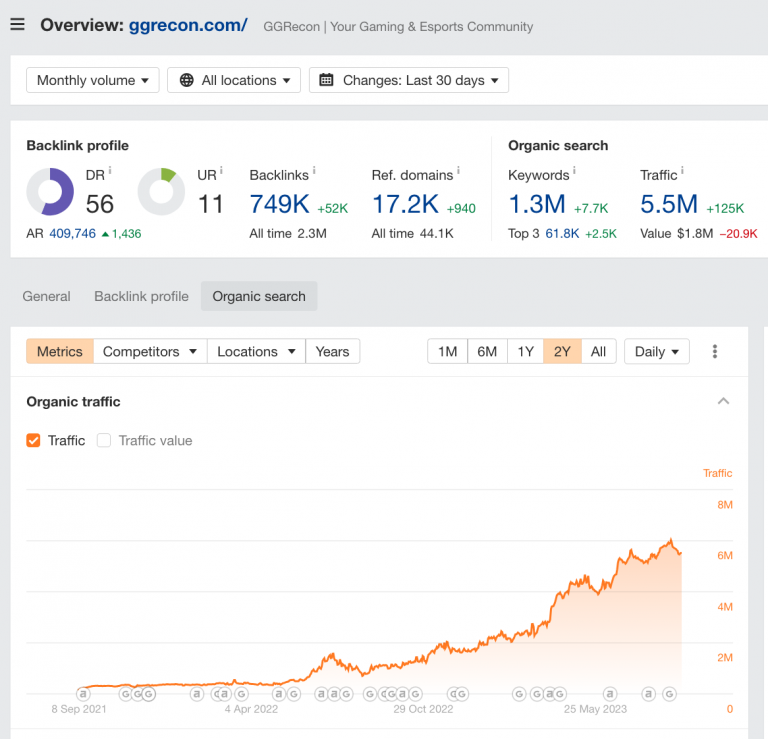SEO at the Intersection of Gaming Cheats and News

Sep 7, 2023 • 6 min read

Did Wordle Reshape the Landscape? What’s Next?
Could you have imagined a simple word game reshaping the boundaries of SEO and digital media?
Join me as I explore the synergy and shifts in this unique space at the crossroads of gaming cheats, news dissemination, and the ever-evolving world of SEO.
My motivations are twofold: a career deeply rooted in this field and a fascination for simple word games.
What I Do
- Look retrospectively at the different landscapes of the publishing business in this space of word game help Pre-Wordle, Wordle Momentum, and After Wordle (now).
- Trace the parallel evolution of Google ranking criteria impacting this SEO game.
- Ponder about the future and how the interplay might unfold with the upcoming generative search.
Key Findings
- Wordle’s disruptive impact was huge; it inspired many websites to pioneer daily answer publications, initially for Wordle and subsequently for other games. This low-tech model lured many competitors, transforming it into a fiercely competitive SEO arena.
- The allure of this lucrative model drew the attention of some major media players. An intriguing question arises: Did their influence extend to shaping the search algorithm, blurring the lines between traditional and News SEO? This remains an enigma.
- As we navigate the era of AI-powered Search, the sustainability of this business model hangs in the balance. While the answer is unclear, the imminent future holds the key to this intriguing inquiry.
Evolving Landscape: Pre-Wordle, Wordle Momentum, and Present
The interactive table below features a representative sample of competitors: Word Game Solvers, Gaming Blogs, and Big Media websites. It also provides key information, concise details, and a snapshot of their traffic evolution across the three pivotal moments.
Search for any term in the search box or order any column by clicking it in the header!
Before Wordle
Prior to Wordle, these three types of domains—word game help, video gaming blogs, and major media outlets — competed in different verticals with little to no overlaps. What they had in common was only the ads-based monetization model.
It is worth mentioning that some of the word finders were part of larger dictionary-related websites.
The Wordle Phenomenon
In January 2022, Wordle skyrocketed, and it was quickly acquired by The New York Times at the end of the month. Its unprecedented surge triggered a cascade of events:
- Word games help websites rapidly adapted their tools to cater to this new sensation.
- Agile mid-sized gaming blogs embraced the trend, launching daily answer publications, initially for Wordle and subsequently for its clones and other games.
- Major media websites also developed their daily answer sections, effectively competing with word solvers and gaming blogs.
The Shifting Landscape in the Latter Half of 2022
The second half of 2022 witnessed a significant shift, primarily driven by the entry of major media players into the competition. Their presence had a substantial impact, displacing smaller players in the field.
This shift led to the emergence of agile solutions inspired by Wordle and NYT Games. Gaming blogs adapted to the evolving landscape and explored new avenues by publishing answers to crossword puzzles and other daily/ more frequent games.
According to Google’s Year in Search 2022, “Wordle” was the phenomenon of 2022, the most searched term on Google.
Let’s take a closer look at the websites that made the most significant impact. Explore how these standout gaming blogs transformed over a short period and also the visible impact on Forbes.






To conclude this chapter, let’s highlight the significant impact on The New York Times’ search traffic, which surged fivefold, primarily attributed to the viral game. The immense influx of Wordle players heading to NYT every day for their Wordle challenge includes those gamers who, to maintain their streaks, sometimes, especially on those days with challenging answers, need help and fuel the traffic of all the websites mentioned above.

Evolving SEO Algorithms: AI's Ascent
According to the latest documentation, Google employs many ranking systems to ensure search results remain “fresh, helpful, people first, great.”
- BERT: Understands word combinations and meanings. Introduced in 2019 it is one of the first AI-based Systems, enhancing language understanding and concept matching.
- Crisis Information Systems: Provides timely info during crises. Not applicable here.
- Deduplication Systems: Prevents repeated appearances of the same content. It can be internal (manageable with canonicals) and external when many pages show the same content, Google systems deciding how many of them deserve their place in SERP. I consider this posing some challenges here since the core of the content is the same for all these pages, but I can also see creative ways of dealing with it from some websites.
- Exact Match Domain System: prevents giving too much credit to exact match domains. Not essential here.
- Freshness Systems: Prioritizes fresh content. It includes many systems like: News Article Schema Markup, Updating the content, Sitemaps & RSS Feeds, Social Signals, and more. In my opinion, the importance of Freshness Systems gradually increased in the overall ranking scores for these pages, making it the most exciting group of factors impacting the dynamics we witness.
- Helpful Content System: Favors helpful, original, people-first content. It was introduced in 2022 and absorbed Core Web Vitals in April 2023. This group of systems is a critical one, especially after the integration of Core Web Vitals. Let’s not overlook the impact of ads since it is the only monetization model used by all these websites.
- Link Analysis Systems and PageRank: Analyzes page linking. Unquestionably, the foundation on which Google Algo was created, even if we just learned that they haven’t been one of the top 3 ranking signals for a while now. Still, given the time-sensitive nature of these pages, we can see pages from new websites (smartly leveraging RSS submissions) often competing successfully with very well-established domains (very high DR).
- Local News Systems: Highlights local news sources. Not applicable here.
- MUM: Understands and generates language, introduced in 2022. Part of the AI-based Systems, enhancing language understanding and concept matching.
- Neural Matching: Matches query and page concepts, introduced in 2018. Also, part of the AI-based Systems, enhancing language understanding and concept matching.
- Original Content Systems: Promotes original content, introduced in 2019. I see them teaming up with Deduplication Systems here.
- Removal-Based Demotion Systems: Demotes websites that received take-down requests. Not very applicable here.
- Passage Ranking System: Identifies relevant web passages, introduced in 2020. Another AI-based System, enhancing language understanding and concept matching.
- RankBrain: Understands word relations, introduced in 2015.
- Reliable Information Systems: Many systems working together to elevate trustworthy content. Among the core systems shaping ranking scores for these pages. They include topic (gaming) and subtopic (word games, codes) authority systems.
- Reviews System: Rewards high-quality reviews proofing experience in using the products. Not applicable here.
- Site Diversity System: Decides when to limit or not the number of SERP appearances for a website. Some websites make their way into more than one SERP feature (News, Top Story, blue link, or even a feature snippet or a passage ranked), while others get two blue links with two different URLs. Still, never have I spotted more than two appearances of the same website.
- Spam Detection Systems: Filters out spammy content. SpamBrain was launched in 2018 and has continuously evolved. I assume none of these websites employs spammy techniques since they have all been doing well for a while now.

To summarize and point out the most relevant aspects related to my analysis:
- Google has ushered in a new era of search powered by pervasive AI integration and many systems continuously working together in unprecedented collaboration.
- This transformation encompasses profound advancements in language comprehension, enabling precise query-document matching down to the passage level and increased power to rewrite the meta descriptions, matching them with users’ queries and intent.
- The introduction of numerous SERP features has elevated user experiences while efficiently deduplicating pages across search results.
- Additionally, schema markup’s evolution has further advanced how websites can leverage freshness signals to help Google deliver helpful, fresh, reliable, and people-centric results.
Now, consider this: Given the AI-dominant nature of the current algorithm, could the influence of major media websites have shifted the balance, perhaps placing more importance on news aspects?
The Next Frontier: SGE and the Gaming-News Nexus
As we near the end, let’s delve into the looming world of gaming help shaped by SGE and take a look at a few SGE answers to queries like “wordle answer,” recent clues from famous puzzles (with or without mentioning “crossword clue” in the query), or even the most recent NYT daily sensation “NYT Connections answers.”





In this exciting journey, we’ve seen surprises at every turn. Ahead, we can see challenges, opportunities, and the boundless potential of adaptation. Let’s close by pondering what’s next in this fast-changing landscape where anything can happen.
- When and How will SGE impact the landscape?
- What challenges and opportunities await gaming help and news websites?
- What strategies will these websites employ to maintain relevance and value?
Thank you for embarking on this journey with me. Feel free to revisit, ask questions, and return for more exciting analysis!
